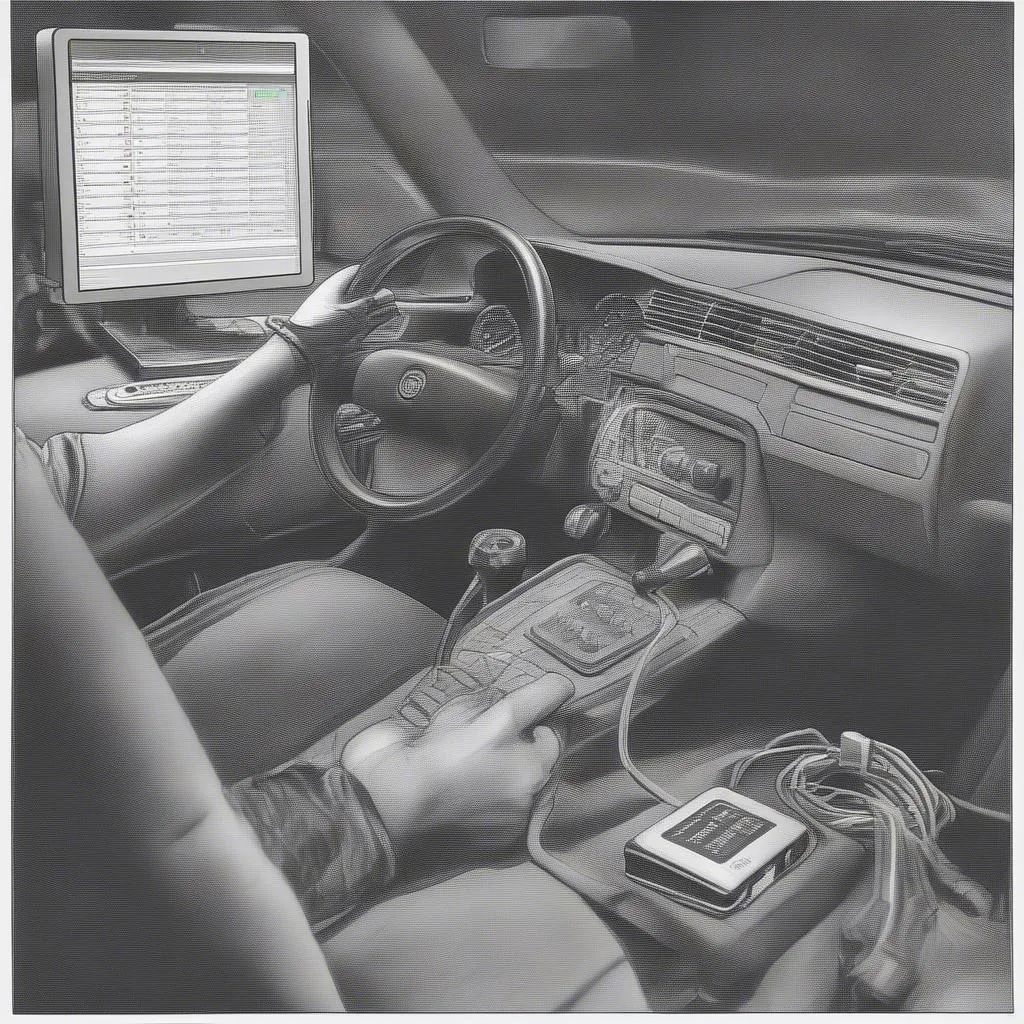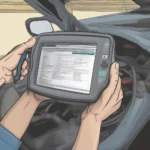Have you ever felt like your car was trying to communicate with you in a language you didn’t understand? That blinking light on your dashboard, that strange noise coming from the engine – it’s enough to make any car owner feel like a detective trying to solve a mystery. But what if there was a way to translate your car’s cryptic messages and get to the root of the problem? Enter the automated diagnostic tool, your car’s very own personal translator.
What is an Automated Diagnostic Tool?
An automated diagnostic tool is a device that connects to your car’s onboard computer system, allowing you to read and interpret diagnostic codes (often called “trouble codes”). These codes are like messages that your car’s computer sends out to indicate that something is wrong. Just like a doctor uses diagnostic tests to determine the cause of illness, an automated diagnostic tool helps you pinpoint the problem in your car.
Why is an Automated Diagnostic Tool Important?
From a Mechanic’s Perspective:
Imagine you’re a mechanic, and a customer brings in their car with a mysterious problem. You could spend hours trying to diagnose the issue by listening to the engine, feeling the brakes, and checking the wiring. But with an automated diagnostic tool, you can quickly access the car’s computer and get a clear picture of what’s going on. This saves you time and money, and ensures that you can provide the right solution to your customer.
From a Car Owner’s Perspective:
As a car owner, an automated diagnostic tool can help you avoid expensive and unnecessary repairs. If you notice a problem with your car, you can use a diagnostic tool to read the codes and identify the issue yourself. This can help you determine if it’s a simple fix you can handle yourself or if you need to take it to a mechanic.
How Does an Automated Diagnostic Tool Work?
These tools work by connecting to your car’s On-Board Diagnostic (OBD) port, a standardized port found in most vehicles manufactured after 1996. The OBD port is essentially a communication gateway between your car’s computer and the outside world. When you connect an automated diagnostic tool, it communicates with the car’s computer and retrieves diagnostic data.
Different Types of Automated Diagnostic Tools
There are various types of diagnostic tools available, ranging from basic OBD2 scanners to advanced dealer-level scanners:
1. Basic OBD2 Scanners:
These scanners are affordable and easy to use. They are mainly for reading and clearing trouble codes. They can also be used to monitor engine performance data, like fuel economy and engine temperature.
Example: You’re driving down the highway and your “check engine” light turns on. You pull over, plug in your basic OBD2 scanner, and it tells you that the code is related to your oxygen sensor. Now, you can research the problem, order a replacement sensor, and potentially fix it yourself.
2. Advanced OBD2 Scanners:
These scanners offer more advanced features, such as live data streaming, sensor testing, and even the ability to reprogram modules. They can also provide detailed information about specific systems in your car, like the transmission or ABS system.
Example: You want to see how your engine’s performance is affected by different driving conditions. You use an advanced OBD2 scanner to monitor your engine’s RPM, air-fuel ratio, and other key metrics in real time.
3. Dealer-Level Scanners:
These are the most powerful and comprehensive diagnostic tools, designed for use by car dealerships and professional mechanics. They allow access to all of the car’s systems and can even perform complex programming tasks.
Example: You’re a mechanic working on a new BMW with a complicated electrical issue. You use a dealer-level scanner to access the car’s ECU and troubleshoot the problem.
FAQs about Automated Diagnostic Tools:
1. Can I use an automated diagnostic tool on my car?
Yes, as long as your car has an OBD port, you can use an automated diagnostic tool.
2. What is the best automated diagnostic tool for my car?
The best tool depends on your needs and your car’s make and model. For basic troubleshooting, a basic OBD2 scanner is often sufficient. If you need more advanced features, consider an advanced OBD2 scanner. For professional mechanics, a dealer-level scanner is essential.
3. Is it difficult to use an automated diagnostic tool?
Many automated diagnostic tools are very user-friendly, with intuitive interfaces and simple instructions.
4. How can I learn more about using an automated diagnostic tool?
There are many online resources, such as websites and YouTube videos, that can teach you how to use an automated diagnostic tool.
5. Can an automated diagnostic tool help me fix my car?
An automated diagnostic tool can help you diagnose the problem, but it can’t fix it. However, knowing the problem can save you time and money by helping you decide if you can fix it yourself or need to take it to a mechanic.
Automated Diagnostic Tools in Action:
Scenario: You’re driving your Ford F-150, and the “check engine” light turns on. You stop by the local auto parts store, purchase a basic OBD2 scanner, and plug it into your car’s OBD port. The scanner displays a code: P0171. After researching the code online, you discover that it’s related to a lean condition in your engine. You decide to check the air filter, which turns out to be clogged. You replace the filter and the “check engine” light goes off! With the help of your diagnostic tool, you saved yourself a trip to the mechanic and potentially hundreds of dollars.
Beyond the Basics:
While reading and interpreting trouble codes is a key function of automated diagnostic tools, they offer a lot more than just basic diagnostics. Advanced features include:
- Live Data Monitoring: This feature allows you to monitor your car’s performance in real-time, such as engine RPM, fuel pressure, and oxygen sensor readings. This can be incredibly helpful for tuning your car’s performance or diagnosing issues that only appear under specific conditions.
- Sensor Testing: Some automated diagnostic tools allow you to perform specific tests on your car’s sensors, such as the oxygen sensor, mass airflow sensor, and temperature sensors. This can help pinpoint problems in individual sensors, potentially saving you the expense of replacing an entire component.
- Reprogramming Modules: Advanced tools can reprogram certain modules in your car, such as the engine control unit (ECU). This is a more advanced feature often used by professional mechanics for tasks such as calibrating a new sensor or updating software.
- Specialised Functions: Some tools are tailored towards specific makes and models, offering specialized functions like ABS system diagnostics, airbag system diagnostics, or even coding specific features in your car.
Example: You’re working on a 2023 Toyota Camry with a malfunctioning ABS system. You use a dealer-level scanner with Toyota-specific features to access the ABS module and perform a complete diagnostics test, identifying a faulty wheel speed sensor as the culprit.
The Future of Automated Diagnostic Tools:
Automated diagnostic tools are becoming increasingly sophisticated and user-friendly. Advancements in technology have led to the development of tools that can communicate wirelessly with your car via Bluetooth or Wi-Fi. Some tools even offer remote diagnostics, allowing you to monitor your car’s health from your smartphone.
The future of automated diagnostic tools is likely to involve even greater integration with smartphones, cloud services, and artificial intelligence. Imagine a world where your car automatically sends diagnostic data to a cloud-based platform, alerting you to potential problems before they become major issues. This type of predictive maintenance could help prevent breakdowns and reduce your overall vehicle maintenance costs.
Conclusion:
An automated diagnostic tool is an invaluable asset for any car owner, whether you’re a DIY enthusiast or simply want to be more informed about your car’s health. With the right tool, you can gain valuable insights into your car’s performance, diagnose problems early, and potentially save money on repairs.
If you’re interested in learning more about automated diagnostic tools or need help choosing the right one for your needs, contact us! We have a team of experts who can provide you with the information and support you need.
Don’t hesitate to reach out to us via WhatsApp at +84767531508 for personalized assistance with any questions you have. We’re here to help you unlock the secrets of your car’s computer and keep you driving safely and efficiently.



